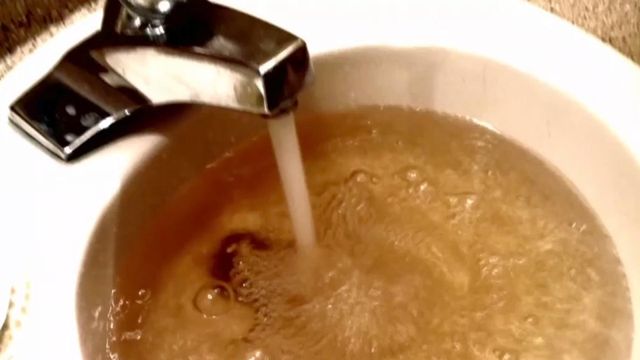Brown water continues to plague private utility's Raleigh customers
After years of seeing tea-colored tap water and taking baths and showers in water that looks like someone already used it to bathe, some north Raleigh homeowners say they are fed up with unfulfilled promises by the private company that supplies their water to fix the problem.
Posted — Updated"We're upset about brown water. We're upset about water that has dirt in it that we're expected to drink," Owen Cavanaugh said. "You just don't want to put your kids into dirty water every single day."
Cavanaugh, his neighbors and homeowners from more than 50 local neighborhoods – many are on Aqua North Carolina's Bayleaf well system, which serves the area between Interstate 540 and Falls Lake – have taken to the social media website Nextdoor to vent their frustrations.
"Seriously? Who's filing a lawsuit... Should post in crime category," one person posted.
"Our water has been dirty for years. I called Aqua many times & got the run-around," another said.
Aqua North Carolina, which provides water to more than a quarter million people in 52 counties statewide, blames the problem on high levels of naturally occurring iron and manganese in well water.
State records show neighborhoods on the Bayleaf system have been plagued for years. For example, iron levels in the Carlyle Manor neighborhood are double the recommended level, while manganese levels are three times higher.
The U.S. Environmental Protection Agency classifies both metals as "secondary" standards and doesn't punish water systems for violating the recommended levels.
Cavanaugh said Aqua is taking advantage of those rules, saying the general response he and others get to complaints is, "The EPA levels say X, and we believe they are below those levels, and we only have to provide water that will not kill you."
"Safe to drink doesn't mean you're comfortable drinking it," he said. "Safe to drink means the water won't kill you. Safe to drink doesn't mean your kids are happy to get into brown water to take a shower."
The state Department of Environmental Quality has issued Aqua various Notices of Deficiency based on complaints about brown water from "poor quality wells," said Allen Hardy, Public Water Supply Section supervisor for the agency. No fines have been issued, however, he said.
Aqua officials said in a statement that the company made about $23 million in capital improvements last year across its 730 water systems in North Carolina and will spend another $42 million this year. The company also has spent $12 million to filter the metals from 62 of its wells since the beginning of 2016, with plans for another nine filter projects to be completed by the end of the year.
Eleven of those filters are on the 121 interconnected wells that serve the Bayleaf system, officials said.
"Systems with new filtration systems have really improved, but that doesn’t mean the problem is fixed everywhere," said Allen of DEQ.
Aqua officials said the company also routinely flushes its pipes and tanks to get rid of mineral deposits and uses a mineral sequestration treatment to help alleviate discolored water.
State rules allow Aqua to pass the entire cost of the filters on to customers without a rate hearing before the North Carolina Utilities Commission. Gov. Roy Cooper panned that cost shift in 2015, when he was attorney general.
"It ought to be more difficult to get a rate increase if the performance hasn't been there," Cooper said at the time.
North Raleigh customers, as well as Aqua customers in Apex and Holly Springs, say the performance hasn't been there for a long time.
"You get frustrated you have to spend a lot of money just to get clean water into your house," said Cavanaugh, who paid Aqua $4,000 for a filtration system.
Even with the discolored drinking water, Aqua's rates in north Raleigh are higher than what Raleigh and Cary charge their water customers.
"I don't mind paying it if the water's clean," Cavanaugh said. "When the water's not clean, you get upset about paying a premium and still having dirty water coming through your tap."
State rules also allow Aqua to continue to expand wells without fixing known water quality issues for existing customers.
State Rep. Joe John, D-Wake, whose district includes many of the north Raleigh Aqua customers, said he believes federal and state regulators hold the power to resolve the situation.
"They need to go to the regulatory agencies, be it federal or state, and to the rate setting agency, the Utilities Commission, and make their issues known there," John said, adding that he understands people's frustration.
"I would be angry," he said. "They're paying for a service, and they're not getting clean water."
Despite the growing gripes online, officials at the Utilities Commission said complaints about Aqua haven't gone directly to regulators. Customers with continual water problems were urged to contact DEQ or the Utilities Commission and provide detailed information on the issue and the customer response from Aqua.
Cavanaugh agrees that Aqua customers need to start voicing their complaints to state officials and not just to each other online.
"This is not a recent problem. This a long-term problem, and we're not seeing resolution from Aqua," he said.
• Credits
Copyright 2024 by Capitol Broadcasting Company. All rights reserved. This material may not be published, broadcast, rewritten or redistributed.





